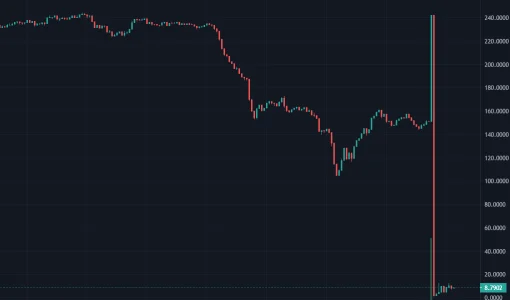Remember the Pancake Bunny hack of 2021? It sent shockwaves through the DeFi world, and now, three years later, the story has taken a new turn. Just when you thought the case had gone cold, the hacker behind the attack has stirred things up by moving a significant chunk of stolen Ethereum (ETH) through Tornado Cash, a privacy protocol. Let’s dive into what’s happening and why this decades-old heist is back in the spotlight.
Pancake Bunny Flash Loan Attack: A Quick Recap
In May 2021, Pancake Bunny, a DeFi protocol operating on the BNB Smart Chain, became the victim of a sophisticated flash loan attack. In simple terms, a flash loan attack is like borrowing a massive amount of cryptocurrency without collateral, exploiting vulnerabilities in smart contracts, and then repaying the loan within the same transaction block. It’s fast, furious, and in this case, incredibly damaging.
Here’s a quick breakdown of the impact:
- Massive Losses: The attacker made off with approximately 697,000 BUNNY tokens and 114,000 BNB.
- Token Value Crash: The price of BUNNY token plummeted by a staggering 95% almost instantly. Imagine the devastation for investors!
- Protocol Disarray: Pancake Bunny struggled to recover from the attack, eventually transitioning into a Decentralized Autonomous Organization (DAO).

The Plot Twist: Dormant Funds on the Move
Fast forward three years to July 7th, and suddenly, the Pancake Bunny saga is back in the headlines. A wallet address linked to the original hacker sprang to life, transferring a substantial 1,002 Ether (ETH) – valued at roughly $2.9 million based on current market prices – to Tornado Cash. This move, first reported by CertiK Alert, signals a clear attempt to obfuscate the trail of these stolen funds.
🚨CertiK Alert🚨
We are seeing fund movement from the PancakeBunny exploiter address (bunnyfinance.near).
1,002 $ETH (approx. $2.9M USD) was transferred to Tornado Cash in the past few hours.
The exploiter address currently holds:
– 3,934 $ETH (approx. $11.4M USD)
– 2.4M $DAI (approx. $2.4M USD) pic.twitter.com/9y7E9lR1bS— CertiK Alert (@CertiKAlert) July 7, 2024
Why Tornado Cash? The Privacy Factor
Tornado Cash is a decentralized, non-custodial privacy protocol built on Ethereum. It allows users to break the on-chain link between the sender and receiver of ETH and other ERC-20 tokens. Think of it as a crypto mixer. When funds are sent through Tornado Cash, they are pooled with other deposits, making it extremely difficult to trace the original source of the withdrawn funds. This is precisely why hackers and those seeking anonymity often turn to such services.
What Does This Mean? Lingering Questions and Implications
The movement of these funds after three years raises several important questions:
- Why now? After such a long period of dormancy, why did the hacker decide to move the funds? Was it due to increased scrutiny, a change in personal circumstances, or simply a strategic decision to cash out now?
- How much is left? CertiK reports that the exploiter address still holds a significant amount of crypto, including $11.4 million in Dai (DAI). This suggests the initial haul was even larger than initially tracked, or that previous movements went unnoticed.
- Can the funds be recovered? Unfortunately, the use of Tornado Cash makes fund recovery incredibly challenging, if not impossible. Privacy protocols, while valuable for legitimate users, also present a major hurdle for law enforcement and asset recovery efforts in crypto crime cases.
Crypto Security: A Constant Battle
This incident underscores the persistent challenges in crypto security and the long tail of consequences from DeFi hacks. Even years after an attack, the threat of stolen funds being laundered and potentially re-entering the ecosystem remains very real. It highlights the critical need for:
- Proactive Security Measures: Robust smart contract audits, continuous monitoring, and advanced threat detection systems are essential to prevent such attacks in the first place.
- Enhanced Traceability Tools: While privacy is important, the crypto industry needs better tools to trace illicit funds even when mixers like Tornado Cash are used. Balancing privacy with security is a complex but crucial challenge.
- Industry Collaboration: Exchanges, security firms, and law enforcement agencies must work together to track and recover stolen assets and bring cybercriminals to justice.
CertiK’s Expansion and Recent Kraken Controversy: A Tangent?
Interestingly, amidst this news about the Pancake Bunny funds, CertiK, the blockchain security firm that flagged the Tornado Cash transaction, has also been in the spotlight for other reasons. They recently announced the migration of their suite of blockchain applications in Asia to Alibaba Cloud, aiming to provide developers with more scalable and secure blockchain development and deployment environments. Ronghui Gu, co-founder of CertiK, emphasized the importance of secure blockchain development, stating:
“For over five years, we have believed in the transformative power of blockchain technology. We look forward to empowering developers with secure blockchain development and deployment through Alibaba Cloud’s platform.”
However, CertiK also recently found itself in hot water with cryptocurrency exchange Kraken. Kraken’s chief security officer accused an unnamed security team – later revealed to be CertiK – of “extortion” after they reportedly discovered a vulnerability and allegedly demanded payment beyond a bug bounty for the return of exploited funds. CertiK, in turn, claimed they were acting as ethical security researchers. This situation, while separate from the Pancake Bunny incident, highlights the complex and sometimes contentious relationships within the crypto security landscape.
Conclusion: Lessons from the Bunny Hack and Beyond
The Pancake Bunny hack and the recent movement of stolen funds serve as a stark reminder of the enduring risks in the DeFi space. Even years after an exploit, the consequences can resurface, and the fight against crypto crime is far from over. While privacy protocols like Tornado Cash present challenges for tracking illicit funds, they also underscore the importance of robust security practices, proactive threat detection, and ongoing collaboration within the crypto industry. As the DeFi space continues to evolve, learning from past incidents and strengthening security infrastructure will be paramount to building a safer and more trustworthy ecosystem.
Disclaimer: The information provided is not trading advice, Bitcoinworld.co.in holds no liability for any investments made based on the information provided on this page. We strongly recommend independent research and/or consultation with a qualified professional before making any investment decisions.


